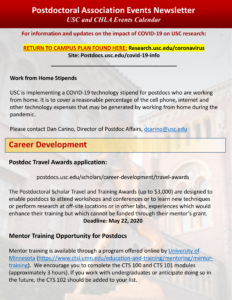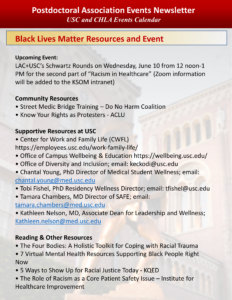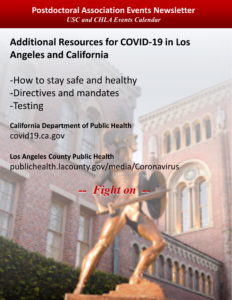June 8, 2020
June 2020 News
Work from Home Stipends
USC is implementing a $53/month COVID19 technology stipend for postdocs who are working from home. It is to cover a reasonable percentage of the cell phone,
internet and other technology expenses that may be generated by working from home during the pandemic.
Please contact your department administrator
OR
Please contact Dan Carino , Director of Postdoc Affairs, dcarino@usc.edu
Mentor Training Opportunity for Postdocs
If you are interested in expanding on your professional/skill development, consider mentor training. Mentor training is extremely useful when providing hands on and instructional guidance to trainees in the lab. The training is an interactive and self paced program offered online by the University of Minnesota https://www.ctsi.umn.edu/education and training/mentoring/mentor training On the site, you will find three mentoring modules available. We encourage you to complete the CTS 100 and CTS 101 modules (approximately 3 hours). If you work with undergraduates or anticipate doing so in the future, the CTS 102 should be added to your list.
To access the training program, you need only to register an external user, https://www.ctsi.umn.edu/sites/ctsi.umn.edu/files/mentoring_modules_registration_guide_2019_external.pdf ).
Once logged into the site, enroll in the courses and launch the session. Upon completion of each module, you will receive a certificate for your records which will give documentation of mentor training that can be included on your CV.
CTS 100
Enhancing Motivation Using the CARES Mentoring Model
(Online, self paced, ~75 minute completion time).
Motivation is a key driver of student and employee engagement, persistence, satisfaction, and performance. This course describes an approach to mentoring that focuses on fulfilling the core psychological needs that enhance a mentee’s motivation. Targeted to faculty who are mentoring students, fellows, or other faculty in academic settings, including research training programs.
CTS 101
Optimizing the Practice of Mentoring 101: For Research Mentors of Graduate Students, Fellows, and Early Career Faculty
(Online, self paced, ~2 hour completion time).
This course is designed to help faculty members or other experienced scientists become more effective research mentors for graduate students, postdoctoral fellows, and early career faculty. Learners are introduced to different mentoring models, roles that research mentors play in their mentees’ development, strategies for building effective relationships with mentees, and application of these strategies to common mentoring scenarios.
CTS 102
Optimizing the Practice of Mentoring 102: For Research Mentors of Undergraduate Students
(Online, self paced, ~2 hour completion time).
This course is designed to help faculty members or other experienced scientists become more effective research mentors for undergraduate students. Learners are introduced to different mentoring models, roles that research mentors play in their mentees’ development, strategies for building effective relationships with mentees, and application of these strategies to common mentoring scenarios.
QBIO 401 – Introduction to Computational Analysis of Biological Data
The Quantitative and Computational Biology ( section is offering a 4 ‐unit course QBIO 401 titled Introduction to Computational Analysis of Biological Data This course goes over six weeks starting May 20 2020 and meets daily M Th from 2 00 pm 4 05 pm This project based course is intended for students who are interested in computational biology The course will integrate the biology, computer science, and statistics training in the QBIO major We will do this by analyzing genomic datasets Students will be introduced to
- The general programming language Python
- The statistical programming language R (No prior knowledge of either language is required
Students will use these languages when doing one to two computing assignments per week and an end of the semester project There will be an emphasis on writing original code and not just using off the shelf
programs In both the weekly assignments and the end of the semester project, students will “get their hands dirty” by analyzing genomic datasets The assignments and project will be based on topics covered in lecture Topics will include gene prediction, sequence alignment, phylogenetic trees, next generation sequencing, meta genomics, population genetics, structural biology, systems biology, and machine learning
This course is eligible for the Postdoc Tuition Remission program: https://postdocs.usc.edu/scholars/career development/tuition remission/
Postdocs and grad students welcome!
For more information, please contact: Postdocs Dan Carino , dcarino@usc.edu
Cellular, Molecular, and Computational Tools for Insights and Analysis for Stem Cell Research
A discussion based group that focuses on relevant topics to the research and interests of the center with an applied learning component (programming lab) so that individuals can broaden their understanding and knowledge of intellectual and applied aspects of work discussed The programming aspect with cover specific tools analyses every other week During the “off weeks”weeks”(odd numbered weeks) a general introductory to programming series will be held to teach members of the center who desire to gain or strengthen computational skills.
Register at https :://tinyurl com/USCStemCell journal coding
Join Zoom Meeting at https :://usc zoom us/j/ 913477250 (Meeting ID 913 477 250 Password 052629)




